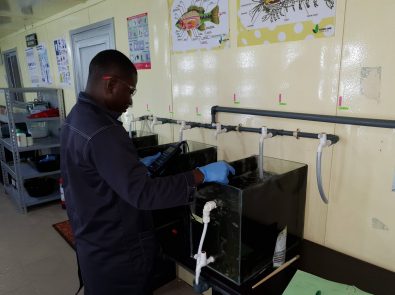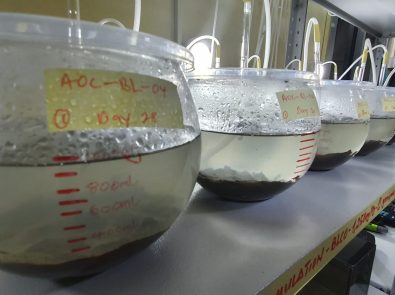





We assess chemicals and commercial products for environmental hazards for use in developing safety datasheets and registration of products with regulatory and trade organizations.
- Toxicity and bioaccumulation testing of oilfield chemicals
- Toxicity testing of oil spill dispersants
- Agricultural product testing
- Safety Data Sheet (SDS) development and hazard classification
- Product formulation studies
- Proficiency testing for treatment technologies
Drilling and exploration activities generate two types of waste: drilling cuttings and used drilling fluids. These wastes need to be effectively treated and disposed of to minimize their impact on the environment. Prior to discharge, toxicity testing is statutorily required.
We carry out 96h LC50 Acute Aquatic Toxicity Tests for these wastes under controlled laboratory environment to ascertain compliance to regulatory thresholds and advise on treatment and disposal options.
Toxicity evaluation is an important parameter in wastewater quality compliance monitoring as it provides the complete response of test organisms to all chemicals and compounds in wastewater. It entails exposing select aquatic test organisms to effluent concentrations under controlled laboratory conditions according to regulatory guidelines and requirements and determining endpoints like the LC50, LOEC and NOEC.
We conduct bioassay procedures on point and non-point discharges, receiving waters and sediments.
- Whole effluent toxicity (W.E.T) testing
- 48h/96h acute water and sediment toxicity testing
- Stormwater runoff toxicity testing
- Hydrotest water toxicity testing before disposal
- Biological monitoring of marine, estuarine, freshwater ambient and receiving water
- Most-Sensitive Species Testing
- Bioaccumulation/bioconcentration testing
- Associated analytical marine chemistry
The Ballast Water Management (BWM) Convention requires vessels to have compliant ballast water treatment systems on board to undertake specific management and record keeping. On the other hand, ports are required to prepare policies and procedures to ensure compliance. Since treatment does not eliminate all organisms and/or active substances, ports and states are required to prove their releases do not pose any environmental risk.
AOC provides ballast water sampling and analytical services to ports, treatment facilities and shipping companies to test compliance with the BWM Convention standards. Our range of analysis include physicochemical characterization, enumeration of microbial and plankton species, testing for toxicity, persistence and bioaccumulation.
- Acute Aquatic Toxicity Testing
- Sediment Toxicity Testing
- Bioaccumulation testing
- Persistence/Biodegradability Testing
- Enumeration of Microbial species
- Enumeration of phytoplankton and zooplankton species
- Physicochemical analysis
Toxicity Identification Evaluation (TIE) studies are used to determine the cause(s) of observed effects in water, sediment or soil and have proven to be an invaluable tool applicable to a variety of environmental issues. The evaluation combines toxicity testing with a suite of chemical and physical fractionation procedures and analytical chemistry to identify the specific constituents responsible for an observed toxicity event.
We offer a wide variety of expertise in developing methods, designing, conducting and interpreting data by TIEs.
We conduct toxicity assessment of freshwater, estuarine, and marine sediments and dredged materials for disposal/discharge in water. Our specially designed flow through testing systems support both freshwater and marine bioaccumulation analyses of sediment composites as well.
- Toxicity and bioaccumulation testing of dredged materials
- Solid-phase and elutriate toxicity and bio-accumulation testing
- Confined disposal facility effluent evaluations
- Design of biological aspects of inland/Offshore sampling and analysis plans
